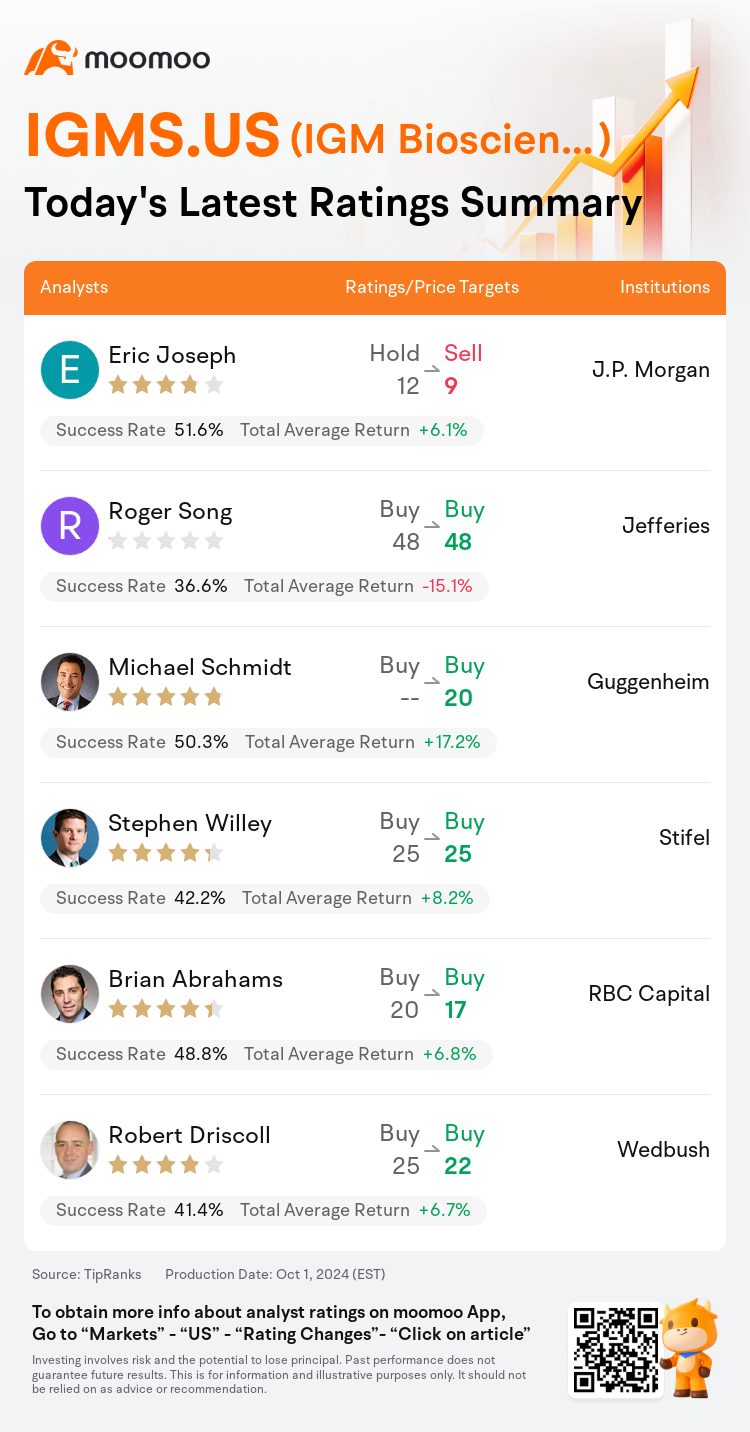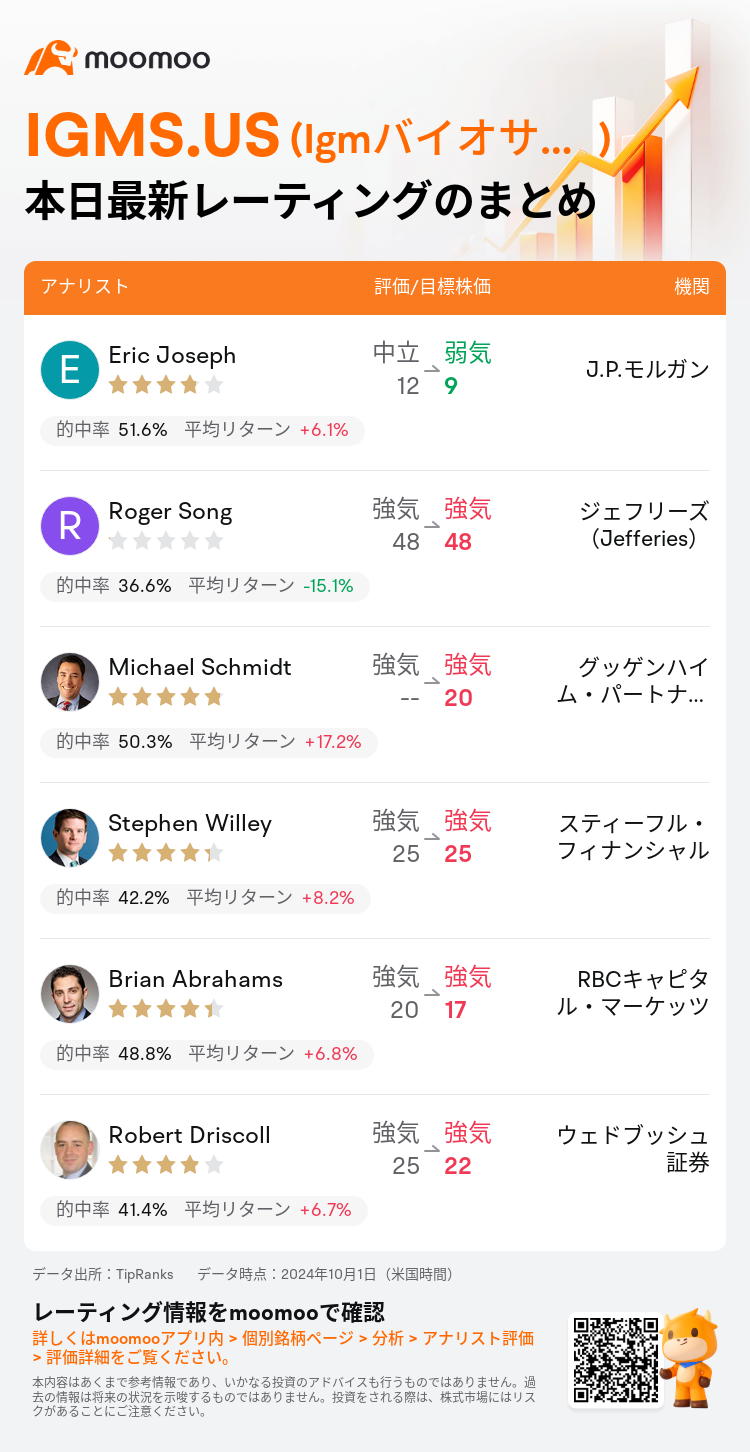On Oct 01, major Wall Street analysts update their ratings for $IGM Biosciences (IGMS.US)$, with price targets ranging from $9 to $48.
J.P. Morgan analyst Eric Joseph downgrades to a sell rating, and adjusts the target price from $12 to $9.
Jefferies analyst Roger Song maintains with a buy rating, and maintains the target price at $48.
 Guggenheim analyst Michael Schmidt maintains with a buy rating, and sets the target price at $20.
Guggenheim analyst Michael Schmidt maintains with a buy rating, and sets the target price at $20.
Stifel analyst Stephen Willey maintains with a buy rating, and maintains the target price at $25.
RBC Capital analyst Brian Abrahams maintains with a buy rating, and adjusts the target price from $20 to $17.
Furthermore, according to the comprehensive report, the opinions of $IGM Biosciences (IGMS.US)$'s main analysts recently are as follows:
IGM Biosciences announced a shift in their pipeline focus, emphasizing their I&I candidates imvotamab and IGM-2644 while discontinuing the oncology asset aplitabart following an interim evaluation of a study for second-line metastatic renal cell carcinoma. Concurrent with this pipeline update, there was a significant turnover among the company's executive leadership. This alteration in strategy has led to a perceived reduction in potential catalysts for IGM's stock value in the mid-term, resulting in a view of an unfavorable risk/reward scenario at the current share price.
IGM Biosciences has decided to halt the advancement of aplitabart in oncology to pivot its attention towards autoimmune diseases exclusively. This strategic shift follows data from a recent trial in combination with FOLFIRI and bevacizumab for second-line metastatic colorectal cancer, which reached full enrollment earlier. Analysts maintain a positive outlook on bispecific T cell engagers for B cell-mediated autoimmune conditions and suggest that IgM bispecifics could offer superior safety and efficacy compared to IgG counterparts. Consequently, forecasts have been adjusted to exclude aplitabart, while incorporating projections for imvotamab in systemic lupus erythematosus due to the redirection of resources and focus.
Following IGM Biosciences' strategic shift to concentrate solely on autoimmune diseases, including halting the development of aplitabart in second-line mCRC and advancing imvotamab and IGM-2644 for autoimmune conditions, analysts perceive the discontinuation of aplitabart as a disappointment. However, it is not considered essential to the core investment narrative as it was deemed a high-risk initiative. The pipeline's recent realignment is seen positively and as a proper strategic decision.
The halting of aplitabart has been seen as a setback, yet IGM Biosciences' transition towards a dedicated autoimmune entity with a focus on T-cell engagers is expected to clarify their investment narrative, concentrate on the most promising sectors, and conserve resources. Despite a drop in the stock's post-market performance, it is perceived as an opportunity to invest before the release of significant autoimmune data related to imvotamab.
Here are the latest investment ratings and price targets for $IGM Biosciences (IGMS.US)$ from 6 analysts:

Note:
TipRanks, an independent third party, provides analysis data from financial analysts and calculates the Average Returns and Success Rates of the analysts' recommendations. The information presented is not an investment recommendation and is intended for informational purposes only.
Success rate is the number of the analyst's successful ratings, divided by his/her total number of ratings over the past year. A successful rating is one based on if TipRanks' virtual portfolio earned a positive return from the stock. Total average return is the average rate of return that the TipRanks' virtual portfolio has earned over the past year. These portfolios are established based on the analyst's preliminary rating and are adjusted according to the changes in the rating.
TipRanks provides a ranking of each analyst up to 5 stars, which is representative of all recommendations from the analyst. An analyst's past performance is evaluated on a scale of 1 to 5 stars, with more stars indicating better performance. The star level is determined by his/her total success rate and average return.
10月1日(米国時間)、ウォール街主要機関のアナリストが$Igmバイオサイエンシズ (IGMS.US)$のレーティングを更新し、目標株価は9ドルから48ドル。
J.P.モルガンのアナリストEric Josephはレーティングを弱気に引き下げ、目標株価を12ドルから9ドルに引き下げた。
ジェフリーズ(Jefferies)のアナリストRoger Songはレーティングを強気に据え置き、目標株価を48ドルに据え置いた。
 グッゲンハイム・パートナーズのアナリストMichael Schmidtはレーティングを強気に据え置き、目標株価を20ドルにした。
グッゲンハイム・パートナーズのアナリストMichael Schmidtはレーティングを強気に据え置き、目標株価を20ドルにした。
スティーフル・フィナンシャルのアナリストStephen Willeyはレーティングを強気に据え置き、目標株価を25ドルに据え置いた。
RBCキャピタル・マーケッツのアナリストBrian Abrahamsはレーティングを強気に据え置き、目標株価を20ドルから17ドルに引き下げた。
また、$Igmバイオサイエンシズ (IGMS.US)$の最近の主なアナリストの観点は以下の通りである:
IgM Biosciencesは、第二選択転移性腎細胞がんの研究の中間評価を受けて、I&I候補であるイムボタマブとIgM-2644に重点を置き、腫瘍学資産であるアピタバートを中止し、パイプラインの焦点を変更したことを発表しました。このパイプラインの更新と同時に、会社の経営幹部の間で大きな交代がありました。この戦略の変更により、中期的にIGMの株価の潜在的な触媒が減少したと認識され、その結果、現在の株価では不利なリスク/報酬シナリオが見えてきました。
IgM Biosciencesは、腫瘍学におけるアプリタバートの進歩を止め、自己免疫疾患のみに注力することを決定しました。この戦略的転換は、以前に完全登録に達した二次転移性大腸がんを対象としたFOLFIRIとベバシズマブを併用した最近の試験のデータに続くものです。アナリストは、B細胞媒介性自己免疫疾患に対する二重特異性T細胞エンゲージ剤について前向きな見通しを維持しており、IgM二重特異性はIgG対応品と比較して優れた安全性と有効性を提供できると示唆しています。そのため、リソースと焦点の方向転換により、全身性エリテマトーデスにおけるインボタマブの予測を取り入れながら、アプリタバートを除外するように予測を調整しました。
第二選択mCRCにおけるアプリタバートの開発の中止、自己免疫疾患に対するイムボタマブとIgM-2644の開発など、自己免疫疾患のみに集中するというIgM Biosciencesの戦略的シフトを受けて、アナリストはアプリタバートの中止は期待外れだと認識しています。ただし、リスクの高いイニシアチブと見なされていたため、中核となる投資物語にとって不可欠とは見なされていません。パイプラインの最近の再編は前向きで、適切な戦略的決定と見なされています。
apitabartの中止は後退と見なされてきましたが、IgM BiosciencesがT細胞エンゲージに焦点を当てた専用の自己免疫組織に移行したことで、投資ストーリーが明確になり、最も有望なセクターに集中し、資源を節約することが期待されます。株式の市販後のパフォーマンスは低下しましたが、イムボタマブに関連する重要な自己免疫データが発表される前に投資する機会として認識されています。
以下の表は今日6名アナリストの$Igmバイオサイエンシズ (IGMS.US)$に対する最新レーティングと目標価格である。

注
TipRanksは、金融アナリストの分析データと、アナリストの的中率および平均リターンに関する情報を提供している独立第三者です。提供された情報はあくまで参考情報であり、いかなる投資のアドバイスも行うものではありません。本コンテンツでは、レーティング情報などの完全性と正確性を保証しません。
TipRanksは、アナリストの的中率と平均リターンを総合的に算出して評価したスターレーティングを提供しています。1つ星から5つ星のスターレーティングでパフォーマンスを表示しています。星の数が多いほど、そのアナリストのパフォーマンスもより優れています。
アナリストの的中率は、最近1年間におけるアナリストのレーティング的中数がレーティング総数に占める割合を指します。レーティングが的中したかどうかは、TipRanksのバーチャルポートフォリオがその銘柄からプラスのリターンを獲得しているかどうかに基づいています。
平均リターンとは、アナリストの初回レーティングに基づいて作成したバーチャルポートフォリオに対して、レーティングの変化に基づいてポートフォリオを調整することによって獲得した最近一年間のリターン率を指します。
 グッゲンハイム・パートナーズのアナリストMichael Schmidtはレーティングを強気に据え置き、目標株価を20ドルにした。
グッゲンハイム・パートナーズのアナリストMichael Schmidtはレーティングを強気に据え置き、目標株価を20ドルにした。

 Guggenheim analyst Michael Schmidt maintains with a buy rating, and sets the target price at $20.
Guggenheim analyst Michael Schmidt maintains with a buy rating, and sets the target price at $20.